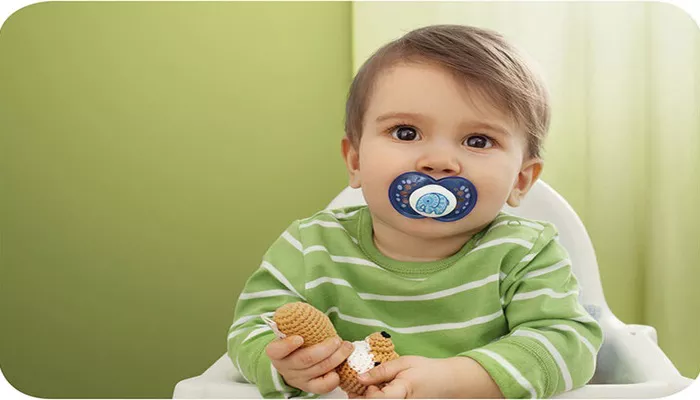Pacifiers are often a source of comfort for infants and young children. They can help soothe a fussy baby and provide a sense of security. However, parents may wonder when it is appropriate to use a pacifier and how it can affect their child’s dental health. This article will explore the benefits of pacifiers, the appropriate age for use, potential risks, and tips for responsible pacifier use.
What Is Pacifiers?
A pacifier, also known as a soother or teether, is a rubber, plastic, or silicon nipple designed for infants to suck on. Pacifiers are often used to calm babies, especially during stressful situations or when they are teething. They can also help satisfy the natural sucking reflex that infants have.
Benefits of Using A Pacifier
Using a pacifier can offer several benefits for both babies and parents:
Soothing Effect: Pacifiers can provide comfort to babies and help them self-soothe. This can be particularly useful during stressful situations, such as doctor visits or long car rides.
Reduced Risk of Sudden Infant Death Syndrome (SIDS): Some studies suggest that using a pacifier during sleep may reduce the risk of SIDS.
The exact reason for this is not fully understood, but it is believed that pacifiers may help keep the airway open.
Easier Transition to Sleep: Many babies find it easier to fall asleep with a pacifier. The sucking motion can help them relax and drift off to sleep more quickly.
Distraction During Painful Experiences: Pacifiers can help distract babies during painful experiences, such as vaccinations or teething.
Temporary Relief for Teething: Sucking on a pacifier can provide temporary relief for teething discomfort.
SEE ALSO: How Much Is Single Arch Orthodontic Treatment
When to Introduce A Pacifier
The introduction of a pacifier should be carefully considered. Here are some guidelines for when to start using a pacifier:
Timing: It is generally recommended to wait until breastfeeding is established before introducing a pacifier. This usually occurs around 3 to 4 weeks of age. Introducing a pacifier too early may interfere with breastfeeding, as the baby may become confused between the breast and the pacifier.
Age: Pacifiers can be introduced to infants from birth. However, it is essential to monitor their use and ensure it does not become a dependency.
Situational Use: Pacifiers can be particularly helpful during stressful situations, such as traveling or medical appointments. They can also be used during bedtime to help soothe the baby to sleep.
How Long Should A Pacifier Be Used?
While pacifiers can provide comfort, it is essential to consider how long they should be used. Prolonged pacifier use can lead to dental issues and other concerns. Here are some recommendations regarding the duration of pacifier use:
Limit Use After Age 2: Most dental professionals recommend weaning children off pacifiers by the age of 2. Prolonged use can lead to dental problems, such as misalignment of teeth and changes in the shape of the mouth.
Monitor Dependency: If a child becomes overly reliant on a pacifier for comfort, it may be time to consider weaning them off. This can help prevent potential dental issues and encourage the development of self-soothing techniques.
Gradual Weaning: When it is time to wean a child off the pacifier, consider doing it gradually. Start by limiting pacifier use to specific times, such as bedtime or during naps. Gradually reduce the time spent with the pacifier until the child no longer needs it.
Potential Risks of Pacifier Use
While pacifiers can be beneficial, there are potential risks associated with their use. Parents should be aware of these risks to make informed decisions:
Dental Issues: Prolonged pacifier use can lead to dental problems, such as misaligned teeth and changes in the shape of the mouth. This is especially true if the pacifier is used beyond the age of 2.
Ear Infections: Some studies suggest that prolonged pacifier use may increase the risk of ear infections. This is thought to be due to changes in pressure in the Eustachian tubes.
Dependency: Children may become overly reliant on pacifiers for comfort, making it challenging to wean them off later.
Nipple Confusion: Introducing a pacifier too early may lead to nipple confusion for breastfed infants. This can make it difficult for them to latch onto the breast properly.
Hygiene Concerns: Pacifiers can harbor bacteria if not cleaned properly. It is essential to keep pacifiers clean to prevent infections.
Tips for Responsible Pacifier Use
To ensure that pacifier use is beneficial and minimizes potential risks, consider the following tips:
Choose the Right Pacifier: Select a pacifier that is the appropriate size and shape for your baby’s age. Look for pacifiers made from safe materials, such as silicone or rubber.
Keep It Clean: Regularly clean pacifiers to prevent the buildup of bacteria. Wash them with soap and water, and sterilize them as needed. Avoid cleaning them by sucking on them yourself, as this can transfer bacteria.
Monitor Usage: Pay attention to how often and when your child uses the pacifier. Limit use to specific situations, such as bedtime or during stressful events.
Encourage Self-Soothing: Help your child learn self-soothing techniques as they grow. This can include cuddling, holding a favorite toy, or using a blanket.
Be Mindful of Weaning: Plan for a gradual weaning process as your child approaches age 2. This will help them transition away from the pacifier without distress.
Conclusion
Pacifiers can be a helpful tool for soothing infants and providing comfort. When used appropriately, they can offer several benefits, including calming a fussy baby and potentially reducing the risk of SIDS. However, it is essential for parents to be mindful of when to introduce a pacifier, how long to use it, and the potential risks associated with prolonged use.
By following the guidelines outlined in this article, parents can make informed decisions about pacifier use and promote their child’s oral health. If you have any concerns or questions about pacifiers, do not hesitate to reach out to your pediatrician or dental professional for personalized advice.

